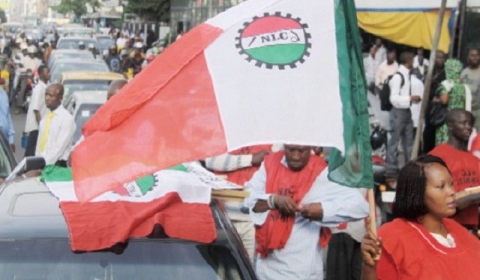Labour to FG: N18,000 wage lapsed March 24

Nigeria’s organised labour on Sunday in Abuja called on the Federal Government to constitute a tripartite committee for the upward review of the National Minimum Wage from N18,000 to N56,000 as demanded. Mr Ayuba Wabba, the President of the Nigeria Labour Congress (NLC) made the call at the 2016 May Day celebration with the theme: “Working Class and The Quest for Socio-Economic Revival’’’, just as his Trade Union Congress (TUC) President, Mr Bobbio Kaigama argued that the current N18,000 Minimum Wage formally lapsed on 24th March, 2016 The NLC and the Trade Union Congress of Nigeria (TUC) had on Tuesday submitted a formal proposal of N56,000 new National Minimum Wage to the Federal Government. Wabba said that the tripartite committee should comprise government; Federal and State, NECA, the organised private sector, and labour to begin the negotiations.
“During the last May Day, we had stated that as soon as the new government to be sworn in on May 29, 2015 settled down, we would table a proposal for a new National Minimum Wage demand. “The National Minimum Wage Act which former President Jonathan signed into law in April 2011 has a five year re-opener clause for new negotiations to review the new minimum wage. “In fulfillment of the above provision, we recently submitted a N56,000 proposal as new minimum wage to the Federal Government. “Our proposal of N56,000 is just N4,000 more than the figure we put out for negotiation in December 2008, which was N52,000. “This represents our awareness about the prevailing economic situation in the country,’’ he said. Also speaking, the TUC President, Mr Bobbio Kaigama said the present economic hardship and its attendant effects on workers had made nonsense of the National Minimum Wage of N18,000. He said that the N18,000 National Minimum Wage had been operational for over five years and called for an upward review to N56,000.
“This has become necessary as the present one formally lapsed on 24th March, 2016. “Indeed, even before we submitted our proposal, we had expected the Federal Government to appoint a committee to handle the issue. “We anticipate that no state governor would dare claim that his state cannot afford the increase. “Each state government should be proactive and look inwards to the state’s bountiful alternative sources of income rather than relying only on statutory monthly allocations from the federation account. He called on the Federal Government to start the negotiation for a new National Minimum Wage, adding that any further delay would be counterproductive. Kaigama also decried the recent recruitment of Permanent Secretaries from outside the civil service.
“We wish to state that the recent appointment of Permanent Secretaries from outside the Civil Service contravened the relevant provisions of the Constitution of the Federal Republic of Nigeria. “This is capable of doing collateral damage to the system. The ill-advised policy, if not stopped now, is capable of killing the morale of senior Civil Servants who have served their fatherland meritoriously for decades. “This because they can no longer aspire to rise to the peak of their career.’’ Kaigama urged the Federal Government to discontinue the practice while those already recruited particularly those above 60 years, should be disengaged. “So, it is very important that the service is equipped with requisite tools to enhance productivity, in addition to providing welfare packages to boost the morale of Civil Servants.
“That is why we are also calling on the Federal Government to ensure that illegal extension of the tenure of permanent secretaries is also addressed.’’ He cited Public Service Rule 020810 which stipulates that retirement age in the civil service shall be 60 years of age or 35 years of pensionable service whichever comes earlier. Speaking at the celebration, President Muhammadu Buhari assured workers that the Federal Government will tackle all socioeconomic ills that have troubled the nation. Buhari, who was represented by Sen. Chris Ngige, the Minister Labour and Employment, said that the government would evolve solutions to the emerging threats to the well-being of Nigerians.
“For us whose main foreign exchange comes from oil, the global decline in the price of oil has further exacerbated our economic crises. “The resultant effect of this are noticeable in government’s dwindling resources, reduction in operational capacities of most companies especially in the oil and gas sector, threats of workforce reduction by multinationals, among others. “These developments no doubt, have socio-economic implication for the economy as well as the working class. “I make no excuses, for this government of the APC is determined to tackle the socio-economic ills headlong.’’ According to the president, development must be sustainable for it to benefit society in general. He said it was therefore, the responsibility of those in power to align themselves with the working class who make development possible, by generating and sustaining the momentum of positive change. He said that the present administration would continue to seek the cooperation of labour, so that together, “ we can attain the enviable heights of progress in our beloved country.
“This administration shall effect positive change in the lives of the average Nigerians, to ensure that the downtrodden are elevated. “Most importantly, we will fight the intense pain of corruption which has enriched the very few to the detriment of the majority of Nigerians who groan under the overwhelming weight of poverty resulting from corruption. “In this fight against corruption, I need you all to be very willing partners. “Fighting corruption in the Public Service in particular, requires the workers to play major roles by cooperating with the government.’’
The president also assured workers that the issues and request raised had already being considered and would be made public in the near future. “I request your cooperation and understanding, as partners in progress. “The need to ensure a conducive atmosphere devoid of incessant industrial action becomes paramount to avoid loss of man hours and accordingly promote high productivity. “I further assure you that working together, this administration will protect workers’ rights and shall promote incentives for great productivity and hence, greater posterity,’’ Buhari said. Meanwhile, Gov. Adams Oshiomhole of Edo on Sunday announced the increment of the National Minimum Wage from N18,000 to N25, 000 with immediate effect, for employees in the State Public Service.
He also promised prompt payment of outstanding arrears of salary to the staff of Local Government Councils in the state. Oshiomhole who made the announcement on Sunday at the grand finale of activities to mark the 2016 Workers Day, said that plans had also been concluded to pay staff of Egor Local Government Council who were being owned 13 months arrears of salary, within the next two weeks. Explaining why the council was omitted from the bailout to local government councils in 2015, he gave the assurance that the Edo Government had been meeting with the Central Bank of Nigeria and that within the next two weeks, the funds would be released and staff of the council would be paid in full. He also explained the reason behind the non -appointment of Caretaker Committees for the 18 local government councils in the state, after the end of the tenure of the immediate-past local government chairmen.
According to him, “rather than appoint caretaker committees for the councils and pay them because they are politicians, we directed the Heads of Personnel Management in the councils to hold forth, so that those monies would be used to run the councils and pay salaries,’’ he said. The governor said even if the price of oil goes to zero per cent, Edo workers would get their salary alerts before the end of every month. He assured that he would not use his office to put hardship on any of his workers. Earlier, the State Chairman of the Trade Union Congress (TUC), Mr Orhue Marshall, appealed to government to enlist workers in the state in the National Health Insurance Scheme (NHIS).








